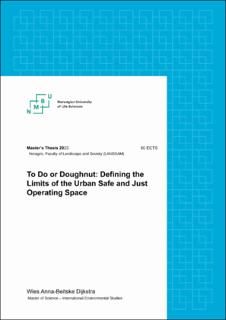| dc.description.abstract | This master thesis explores the relevance of the doughnut for sustainable urban planning and decision-making in the context of planetary urbanisation. The doughnut economics model outlines an ecologically safe and socially just operating space for humanity to operate in. The objectives of the study are to describe recent advances in downscaling the doughnut to the local context, explore the doughnut's relevance for sustainable urban planning and decision-making, and evaluate these findings in light of ongoing planetary urbanisation.
The study is relevant because of the urgent need for urban planning and decision-making practices that consider the global impact of local actions and the emergence of the local as a battleground for global sustainability. The thesis used a qualitative research approach, specifically a literature review and case study method, to describe the application of the doughnut model in the local context. Semi-structured interviews were conducted with seven participants who were involved in applying the doughnut model locally. The interviews were transcribed, coded, and analysed thematically to identify patterns and trends between cases.
Results show that working with the doughnut can enhance strategic planning practices by providing a meaningful definition of sustainability that can be communicated both internally and externally. A shared definition of sustainability, among others, promotes goal coherence, and ex-ante consideration of impacts. The findings indicate that local governments have limited capacity to address the different dimensions associated with broader sustainability considerations, calling into question the dominant narrative of the role of cities in saving the planet. The findings indicate that applying the doughnut is mostly relevant for enhancing local exchange processes between actors and strategic planning, but provides limited support for addressing urbanisation impacts at different scales. Working with the doughnut does not inherently challenge the hegemony around local urban and economic growth, as these remain key in meeting the needs of urban dwellers.
The results highlight the need for greater efforts to integrate intergovernmental and academic sectors in sustainability planning to address the cross-scale interactions of urbanisation. Recommendations are made for future research and practice. Working with the doughnut stimulates cities to consider the broader impacts of local actions; this provides an opportunity to change the status quo of interactions between actors in the local governance system, possibly redirecting the operations of local institutions. However, this study raises questions about whether incremental actions of local actors will be enough in halting the rate and pace of socio-ecological deterioration in the age of the urban. | |
